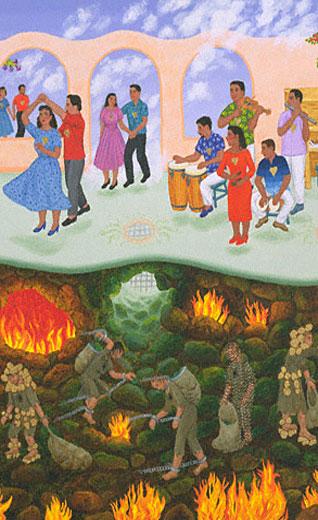Columnists
Heaven, Hell & Places Between
by I.J. SINGH
When we think of a life beyond this earthly one, an ocean of images floods the mind, and knowing how we might have lived, we find some images are frighteningly dreadful.
Can you imagine burning in hell forever? That is how many organized religions terrify us.
And then there are the promised rewards if you die in the name of the religion.
Just think of the terrorists who destroyed several thousand innocent lives along with the World Trade Center, the symbol of U.S. financial might. They are promised a never-ending supply of virgins to deflower. Come to think of it, there are females suicide bombers too. Are they also promised a heaven, and what do they get - a never-ending supply of hunks?
It is really immaterial whether the supply of dancing houris is limited to 72 or is endless; nor is it important if the women who have earned heaven have other options, like turning into beautiful angels. These models of heaven and hell are more indicative of human limitations of imagination than a commentary on any godly design.
Mythology is helpful to some extent. In ancient Hindu mythology, the Brahmin sage Vyasa tells us that heaven, the place of the Hindu god Vishnu, is located on Mount Meru. It is entirely made of gold, with a circumference of 80,000 miles. All buildings are made of jewels. Vishnu is seated on white lotuses and Lakshmi sits at his right hand. The fragrance from her body spreads for 800 miles.
Another Hindu god, Brahma's heaven, Brahampuri, is 800 miles long by 400 miles wide by 40 miles high, and all the beings created on earth are found there.
The world of Brahma extends over 10,000 yojanas (1 yojana equals 4 miles) on the Mahameru Mountain as described in Devi Bhagavata. There are eight cities in this heaven, each of which measures 2,500 square yojanas in size. In the center of Mahameru is Brahma's city Manovati.
Then there is a different heaven attributed to Indra, the king of gods in Hindu mythology. His heaven is called Amaravati, located east of Manovati. Amaravati is the eternal city.
Suspiciously accurate are all these numbers and names, aren't they, and quite a tribute to human imagination.
Judeo-Christian concepts are no easier to understand, nor are they any less imaginative. Metaphorically speaking, heaven is the transcendent dwelling place of the living God. God cannot be contained in his heaven. "Heaven" is simply one of God's names; this, then, becomes the transcendent living place of God to which believers, through grace, can ascend, as we see in the accounts of Enoch (Genesis 5:24) and Elijah (2 Kings 2:11).
Thus heaven becomes an image of life in God. In this sense, Jesus speaks of a "reward in heaven" (Matthew 5:12). Jesus "passed through the heavens" (Hebrews 4:14) and "entered, not into a sanctuary made with hands, a copy of the true one, but into heaven itself" (Hebrews 9:24).
Since the Father loves the believers, they are raised with Jesus and made citizens of heaven.
Then there is the Christian model of heaven, where those that Saint Peter finds suitable reside next to God and Jesus, perennially singing God's praises 24/7.
Mark Twain, in his Letters from the Earth, pointed out the absurdity of the notion. God, he concluded, must be supremely bored, selectively deaf or massively insecure to be pleased to hear his own praises non-stop, from a crowd of his admirers who could not carry a tune in their lifetimes on earth.
And Jesus, say the Christians, sits in close proximity to God and on his right side only. This surely leads to a three-decker model of the universe, with heaven somewhere above and hell beneath us, a model that is supremely unrealistic in its otherworldliness. For many believers, heaven and hell are geographical places as tangible as the houses we live in here on earth.
Realizing full well the desperate qualities of our lives, people all over the world and across time and distance have wrestled with the idea of a reward for exemplary behaviour and punishment for our transgressions.
Religions have contributed mightily by constructing complicated systems for the purpose and, as any good penal system must have, also designing a way station or purgatory where some degree of atonement and rehabilitation is possible before one is consigned to a final destination.
Christian belief is no less baffling and imaginative in this matter. In the complicated afterlife of a Roman Catholic believer, not only are there real places called "heaven" and "hell," but also a purgatory, a sort of a waiting room for those with only some venial faults, where a degree of atonement is possible before final consignment to heaven or hell.
When Catholics were reminded that many babies in the world have died without being baptized, and many good people may have lived and died without hearing or accepting the teaching of the Church, the theologians designed the nether world of Limbo for them. Limbus infantum is the place for infants who die without receiving baptism, while limbus patrum is for souls of the righteous, including the prophets who died before the death of Jesus. The word "limbo" is rooted in the Latin limbus, meaning "border."
These days, the Church is revisiting the whole idea of Limbo, and there is serious debate that perhaps the concept needs to be revisited, and maybe even jettisoned.
I suppose that would be consigning Limbo to limbo.
On July 28, 1999, Pope John Paul II reflected that "hell was the definitive rejection of God ... the ultimate consequence of sin and ... the state of those who freely and definitively separate themselves from God, the source of all life and joy."
On August 4, 1999, following his catecheses on heaven and hell, the same Pope explained that "the term purgatory does not indicate a place, but a condition of existence, where Christ removes ... the remnants of imperfection."
For Muslims, hell, or dozakh, is a more complicated structure, starting with purgatory (johannum) and ranging from five levels of intense fire to a bottomless pit (hawayah). I suppose the seven levels of hell correspond to their seven levels of heaven. Paradise, or heaven (bahishta), for Muslims is a place that gives pleasure to each of the senses. The faithful who fall in battle are promised beautiful damsels known as houris or apsaras. "Who do good works and believe in Him, will be offered gardens, rivers, and pure companions," says the Koran, Surah IV-57.
The Sikh view would be that turning away from godly instincts and indulging in baser behaviour is living in hell. Living a productive life of service in an awareness of the Infinite that is within each of us is heaven.
In Sikhi, there is no geographical entity or place called "Heaven" or "Hell" where people are destined to go after they leave the world.
Many in this world believe in a place created by a partisan God for the believers of a particular faith and that is heaven, and another place where all non-believers will suffer and that is hell.
This runs absolutely counter to Sikh ideology. Only he who considers everyone equal in the eyes of God is truly religious. "In the next world, caste and power will not prevail," says Guru Nanak ("Agea Jaat Na Jour Hai," Guru Granth, Asa di Var, p 469).
Heaven and hell, then, become a state of mind, not real places wherein to spend eternity. The goal of human life is not to qualify for admission to a nonexistent heaven or be fearful of a mythological hell, but to become a person who walks in the shadow of God. Heaven and hell are right here and we create them every day. A person is judged by his deeds, not by his beliefs.
No religion can claim a franchise on God. Thus Sikhism is not a proselytizing faith, though it welcomes converts, nor does it disrespect other religions, even though it may differ on specific points of interpretation.
According to Sikhism, all gods and goddesses will pass away; they have no immortal existence or permanent abode. The concept of an eternal city or heaven, therefore, cannot be valid, unless we think of it as Abcchal Nagar, the everlasting city of the Lord (GGS: 785) or Begumpura, the City of Bliss [GGS: 345].
These are not real townships with measurable dimensions and fixed addresses but rather are reflective of a state of mind.
Thus, in the Sikh way of life, the emphasis shifts from a needless worry about heaven, hell or purgatory after death to the quality of life here and now on this earth. If our time here is spent as good, productive humans who work at discovering and nurturing the universal connectivity of creation, then we are in heaven; otherwise our very existence is hell.
Living the moment wisely and fully is living in God's hukam (will) and nadar (grace). And that is heaven.
Hindu philosophy promises us salvation if we bathe at 68 places of pilgrimages. Guru Nanak admonishes us that this will not wash away our sins; only listening to the Infinite within us will ("Atthsatth tirath jeh naahveh taan utreh naheen mayl"). [Asa di Var, GGS:473]
Rituals will not save one, self-awareness will, says Kabir [GGS: 480]: Roza dhareea niwaz guzarea kalma bhist na hoi, Aap janaey avar kou janea tub hoi hhist sirikee. ("He fasts, prays and recites Kalima, this is not the way to heaven; Understand yourself and others, thus is heaven attained.")
"Heaven is the vision of fulfilled desire; hell is but the shadow of a soul on fire," opined Omar Khayyam. But what to desire is the question that we must first face honestly. And that isn't easy. Pray for the gift that your inner hunger is satiated, says Guru Nanak ("Deh naam santokhia utrey munn kee bhukkh.") [GGS: 958]
Does heaven lie in knowing Quantum in me fuit - that I did the best I could?
 
August 31, 2009
[First published as an essay in: The World According to Sikhi, by I.J. Singh. The Centennial Foundation, Guelph, Canada, 2006.]
Conversation about this article
1: Baljit Kaur (Washington, D.C., U.S.A.), August 31, 2009, 11:25 AM.
I recently heard a speaker invited to give a talk on Naam Simran at a Sikh children's camp in this area, going on and on about the different kinds of hells, and thus badgering them into doing simran. It was utter gibberish and none of it had anything to do with Sikhi. He claimed he had picked up this 'wisdom' in his recent sojourns in India. I've heard from other parents about his rantings at other camps as well. I suspect the camp organizers have no idea what he teaches the children, once they've invited him. I love I.J. Singh's decription of the straight-forwardness of Sikh thought on this subject. I hope our community elders will keep the hell-bent nut-case away from our children in the future.
2: Gurbux Singh (Chatsworth, California, U.S.A.), August 31, 2009, 12:46 PM.
Thank you for telling it the way it is. The Sikh way is very simple and straightforward. Belive in and bow your head to the Guru and pray to Waheguru. All else is in vain.
3: Gurdip Singh Chana (London, England), August 31, 2009, 4:07 PM.
Very refreshing article. I have through my own reading (and Waheguru's grace) understood Heaven and Hell in the same way as I.J. Singh has explained. But I am very glad he has been able to summarize the Sikhi way in a clear and easy-to-understand method and reflect upon the mess created by organized religion. I pray to Waheguru that more people like I.J. Singh enter this world and take us Sikhs as well as other religious members out of ignorance and superstition and lead us into a true 'new age'.
4: Jagjeet Singh (Portage, Indiana, U.S.A.), August 31, 2009, 7:04 PM.
Great article and I very much agree with it. Any thoughts on reincarnation? What happens after we die having lived a life in God's Hukam?
5: I.J. Singh (New York, U.S.A.), August 31, 2009, 7:40 PM.
In response to the query by Jagjeet Singh, I have an essay on this topic that is posted on sikhchic.com. You can find it in the batch from 41-50 in the list of my columns. Yes, by all means, let's talk about it. You can also send me a note on ijsingh99@gtmail.com. Don't you think that a life lived in Hukam (and Nadar) is its own reward? Thank you.
6: Gurjender Singh (Maryland, U.S.A.), September 01, 2009, 9:58 PM.
Real life article. As I.J. Singh ji mentioned about Abcchal Nagar and Begumpura, the City of Bliss, these maybe due to the state of mind of an individual who has achieved that stage?
7: Gurmeet Kaur (Atlanta, Georgia, U.S.A.), September 05, 2009, 7:16 PM.
Bhagat Kabir says: "Apne karam ki gat mai kya jaanu, mai kya jaanu baba rey" - "How do I know the end state of my karma, O father ?" [GGS:870] In the same shabad, he proclaims the uselessness of a man to others ... The humility of the Guru to surrender to the complexity of heaven and hell, as well as karma and consequences, to God and to focus on serving and being of use to humanity is an amazingly powerful concept. I agree with you, Dr. I.J. Singh ji, heaven lies in knowing that I did my best; that I helped and served.
8: Saharooja (London, England.), December 12, 2009, 9:10 AM.
Lopsided and biased view of Islam. Islam punishes oppressors, and the selfish and greedy people. The victims and the pious good will be rewarded with jannah for keeping the covenant with God and loving him and doing good to His people. The Sikh view of the afterlife does not bring justice or fairness and equality. Most people will not fear 'mental hell' of not believing you have tried your best, they will keep on oppressing, stealing and abandoning the poor. Injustice will continue to be rife on earth. Rich and wealthy people will continue to manipulate law. At least in Islam, we have shariah law that protects us from vulture-like power mongerers!






